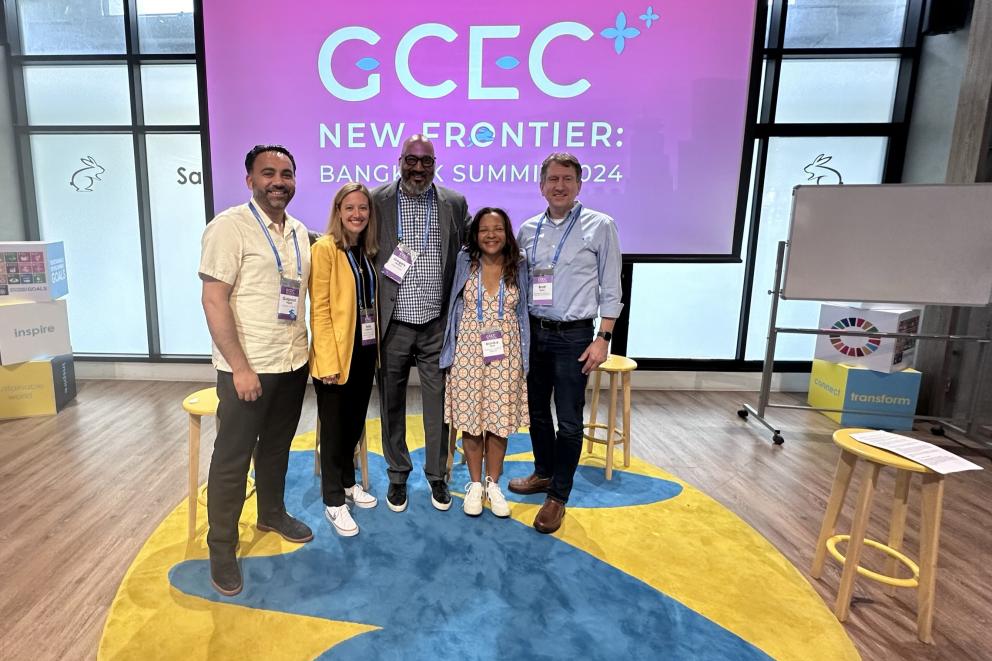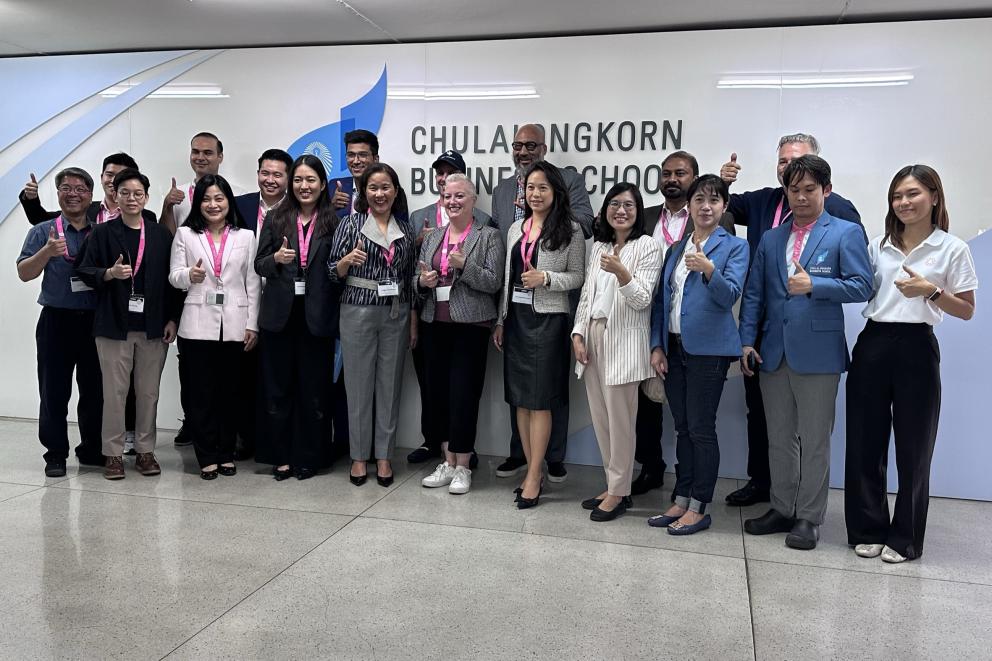Gregory Thomas Showcases Entrepreneurial Expertise in Bangkok
September 12, 2024

When Gregory Thomas ’91 touched down in Bangkok in June to participate in the Global Consortium of Entrepreneurship Centers (GCEC) Summit and act as a judge for this year’s Hult Prize Bangkok Regional Summit, he knew he was walking into his element.
As the executive director of the Berthiaume Center for Entrepreneurship since 2018, Thomas has been organizing and emceeing events each year on the UMass Amherst campus, supporting student teams through venture development and boot camps, and inviting panels of professional judges to evaluate which projects have the best chances for success. Through his work supporting entrepreneurship at Isenberg, on the UMass campus, and throughout the Pioneer Valley, he interacts with local, regional, national, and international organizations, including the GCEC. The consortium connects university-based entrepreneurship centers across the world to enable better communication and collaboration and address relevant topics to advance innovation and entrepreneurship.
Thomas became a member of the GCEC’s executive advisory board in 2020. He also serves on the site selection committee, which selected Bangkok to host this year’s inaugural Asia GCEC Global Summit event. Thomas was one of the driving forces in bringing the first summit to Asia.
“We were getting a lot of international applications, especially from Asia,” Thomas said. “So we were thinking about how to be creative, do something new, and build our international presence. There were three different choices, and we landed in Bangkok.”
When asked to judge one of the many regional Hult Prize events—an annual competition that challenges students to present an entrepreneurial venture that addresses a pressing social or environmental issue—he was excited to learn that one would be happening during the GCEC conference in Bangkok.
“I love my work back home with UMass and local entrepreneurs, but it was a real treat to spend time with people working to create the same kinds of opportunities around the world that we're immersed in at the Berthiaume Center for Entrepreneurship,” Thomas says. “My counterparts at the GCEC and my friends and colleagues at the Hult Prize are laser-focused on helping young people with great ideas effect change in the world. We’re all working together to ensure their innovations have a chance to shine, locally and globally.”
An Entrepreneurial Spirit
Thomas says he’s been an entrepreneur all his life. “In junior high, I had a paper route, I was a caddy for various country clubs, and I shoveled snow,” he says. “In high school, I maintained a barbershop janitorial service, and when I was in college at UMass, I had an image-building service, helping students to perfect their resumes and cover letters.”
After completing his bachelor’s degree with individual concentration (BDIC) emphasizing computers and education, at UMass in 1991, Thomas worked for several Fortune 500 companies, primarily at Corning Incorporated. Since being selected to lead the Berthiaume Center for Entrepreneurship six years ago, he has built a legacy fostering innovation and entrepreneurship across the campus.
The Berthiaume Center has thrived under his leadership. He has increased the number of pitch competitions from a single fall Innovation Challenge event to a full series called the Innovation and Entrepreneurship Academy, which includes the Minute Pitch, Technology Challenge, Hult Prize Challenge, and Executive Pitch competitions. The spring 2024 Innovation Challenge distributed $65,000 in venture funding to competitors.
The Berthiaume Center provides student participants with coaching and support for all of these competitions. The center has also created a series of State of Innovation and Entrepreneurship Reports highlighting the work of all the schools, colleges, departments, and special programs at UMass Amherst that support community members’ innovation and entrepreneurship efforts.
The Berthiaume Center is now introducing two in-residence-hall campus programs. The Innovation and Entrepreneurship RAP, or residential academic program, is launching in fall 2024 for first-year students; and a co-curricular living-learning community for sophomores and above begins in fall 2025. First-year I&E RAP students room together in a residence hall, take a three-credit I&E course as a cohort, and receive mentorship and networking opportunities. The center is also working with campus partners to introduce an entrepreneurship certificate available to all students, a unique offering among U.S. universities.
“I think our accomplishments have been many,” Thomas shared. “And I’m very proud of the work that went into them.”

Visiting Bangkok
At the GCEC Summit, Thomas enjoyed the many opportunities to connect with fellow leaders in entrepreneurship and education.
“Everyone entered the room to share, to benchmark, to learn, to give, to grow,” he says. “With a central topic and theme of ‘New Frontier,’ the summit emphasized the importance of inclusive, globally connected entrepreneurship.” In addition to attending panel discussions and other sessions, Thomas was a featured speaker on two panels: “Accelerating Sustainable Development Goals for Impactful Entrepreneurship” and “Challenges and Opportunities for Launching and Sustaining Entrepreneurship Centers.” During these panels, Thomas emphasized the importance of ensuring that an entrepreneurial idea has a sustainable business model. “You don’t just invest one million dollars because the idea is cool, right?” he says. “How are you going to do it? How is this going to operate in perpetuity?”
Similar questions applied in the process of judging competitors for the Bangkok Regional Hult Prize. Thomas was excited to strengthen the relationship between Hult and UMass Amherst, which was established through years of offering a university-level Hult Prize competition, which feeds winners to regional competitions. In 2021, UMass hosted a regional Hult Prize competition that included more than 60 ventures across the globe competing for a chance to move on to the semifinals and beyond to compete for the organization’s annual $1 million prize. In Bangkok, Thomas judged the preliminary and final rounds of the regional competition.
“I enjoyed judging both rounds intensely,” says Thomas. “I loved seeing teams have ideas similar to things that I see here at UMass. Seeing how collaborative the teams were, how they communicated their business models, plans, ideas, paths—it was awesome.”